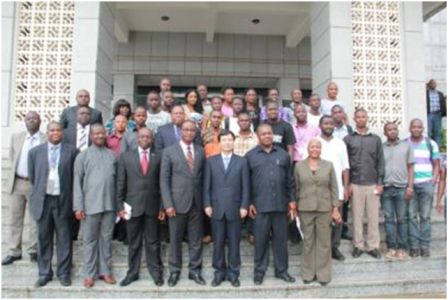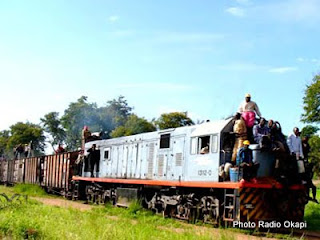Close relatives of Hajaratu Serry; a Staff Nurse who was
attached to the Connaught Hospital prior to her death past Saturday, are
still grappling with traumas, especially those relating to
circumstances surrounding the demise of their loved one.
Reports attributed to the death of the nurse are received with
mixed-interpretations; while some sections of the public, particularly
those who rely on information culled from the social media are pointing
at the Ebola virus, closed relatives who witnessed in anguish, the
nurse’s journey to eternity, consider her death an “unfortunate” event.
Explaining in tears at her resident situated at H-95 Clay Factory in the
east end of Freetown, Adama Bangura,
wife of the late nurse’s uncle
could still not fathom the seeming neglect Hajaratu allegedly
encountered while admitted at the female Annexe attached to the
Connaught Hospital.
Sobbing through her explanation while sitting on a reclining bench at
the veranda of her resident, Adama said that
the late nurse did go to
work on the 25th of August, without complaining of any sign of sickness.
The following day, she narrated, the nurse complained that she had some
sickening experience believed to be malaria. But, as a nurse, she
decided to administer some anti-malaria drugs; a regimen she continued
until the 29th of August.
However, Adama furthered, during the period of administering those
drugs, Hajaratu did not exhibit any severity of her state of illness,
as
she was able to move in and out of the community. At the same time, the
thought of Ebola virus never existed because the established signs and
symptoms of the deadly haemorrhagic fever were not perceived during her
short illness at home.
Meanwhile, Adama explained that the late nurse was observing her
menstruation period, which she herself did confirm. But because of her
continuous state of illness within the three days period, her husband,
Osman Bangura, who happens to be the late nurse’s uncle, advised that
Hajara be taken to the hospital for proper diagnosis.
But it was reported that Hajaratu vehemently refused her uncle’s
proposition of taking her to Connaught Hospital; supposedly because, she
was a testimony of the sheer neglect patients are being exposed to when
they are being taken to the hospital, particularly in the wake of the
Ebola outbreak.
However, complacent with her status as a Staff Nurse, she declined her
refusal and boarded a Taxi that had been chartered by her uncle.
While admitted at the Annexe female ward, Adama explained that the late
nurse was administered a drip by two of her colleagues in a bid to
sustain her, as she had apparently lost appetite. Since then, she
lamented, she was never given a due medical attention.
A close male friend of the late nurse, Abu Bakarr Dakowa expressed his
saddest experience ever in his life, while he painfully watched his
loved one travelled to eternity. He said that to the time of his
presence in the ward, no thorough medical attention was accorded to his
friend. He lamented that while the late nurse was on drip and wanted to
use the ladies’,
there was no health worker to aid her. Instead, she
struggled aiding herself in removing the I.V injection in a bid to
attend to nature. On her return from the ladies’, he explained, she
nervously attempted to re-administer the drip, and in the process, she
bled profusely, as she continuously missed her vein in trying to do so.
He testified that to the time he was asked to leave the hospital at
around 11 pm, no health worker was there to give the nurse due
attention.
He claimed that he had been told that the late nurse was only going to
be given treatment if an Ebola test was conducted. As a result, he
asserted, “even the common care that used to be given to patients was
denied the nurse.”
The following morning; Saturday 30th August, he said, they watched
(parents and loved ones) when the late nurse was helplessly brought out
of the ward on a stretcher and dumped in a nearby ambulance that had
been well-fumigated in their presence; and then whisked off, with no
health worker explaining to them what had happen.
However, what now remains a concern to relatives of the deceased nurse
is that if ever the nurse died of Ebola, why have they not been told?
Why has the team not quarantined their home or check their status, since
the late nurse lived with them, So that plans could have been put in
place from the very day of her death, to prevent the spread of the
disease?
Instead, “false” rumours in social media have it that the late nurse was
one of the nurses working in late Dr. Modupe Cole’s team; and that
immediately his death, the late nurse was tested positive of Ebola and
was taken to the Kailahun Treatment Centre, where she was battled with
till her death.
However, concerned citizens have viewed that the neglect of patients, in
most cases, to sicknesses that require immediate attention is
discouraging them from going to the hospital. They hold the belief that
if they report to the hospital (early or later) for ailments such as:
complication or for other sicknesses that share similar symptoms with
Ebola, they would be abandoned by health workers to death.
“If a Staff
Nurse could be abandoned at the very hospital she was serving to death,
what about us” a group of young ladies lamented.
By Poindexter Sama
Thursday September 04, 2014
http://awoko.org/2014/09/04/sierra-leone-news-staff-nurse-was-abandoned-to-death-witnesses-claim/



 TRANSLATE
TRANSLATE

















